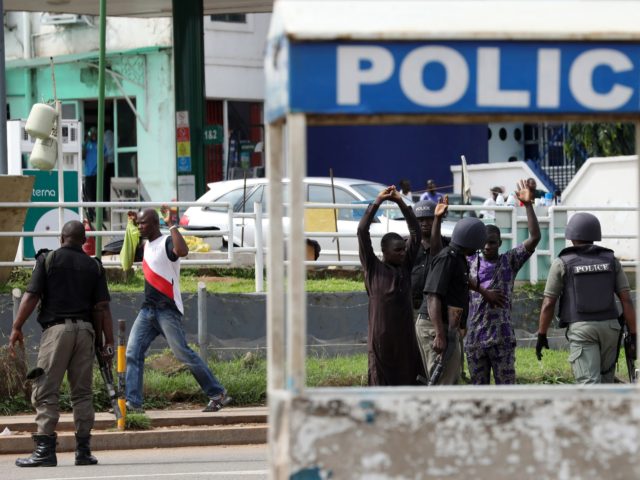A leading Islamic law group in Nigeria accused the country’s Christian clerics on Friday of stoking religious tensions to turn anti-police protests nationwide into forces of anti-Muslim violence, Nigeria’s Premium Times reported on Friday.
The Supreme Council for Sharia’ah in Nigeria (SCSN) alleged on Friday that ongoing anti-police protests in the country’s most populous city, Lagos, and across the nation have shifted in recent days “from ‘a patriotic undertaking into a religious and regional conflict’ due to ‘unguarded utterances’ of some Christian clerics.”
SCSN, a group promoting sharia, or Islamic law, in Nigeria, did not specify which Christian clerics exactly had made “utterances” against Nigerian Muslims. “The group said Muslims and their property came under attack by violent mobs in the wake of the #EndSARS protests due to the alleged inciting comments,” according to the report.
“#EndSARS” refers to the nationwide protest movement to end SARS – the Special Anti-Robbery Squad of the Nigerian federal police – which has overtaken major cities across Nigeria in recent weeks. The government responded to the protests against the unit’s alleged abuses by disbanding SARS on October 11, but the anti-police demonstrations have continued and devolved into violent rioting in several cities, according to the report.
“It is unfortunate and disheartening that some individuals, including notable Christian clerics, rather than cautioning their followers and help contain the escalating violence, they instead aggravated it through their unguarded utterances [sic],” SCSN spokesman Muhammad Bin-Uthman said at a press conference.
“We strongly believe that those utterances, sometimes from the pulpit, helped in turning what was presented as a patriotic undertaking into a religious and regional conflict as we are witnessing now,” he added.
“In Lagos, prominent Muslims were attacked and their businesses torched. The Oba [local Islamic leader] of Lagos had to be rescued out of his palace and the building looted and razed down. It is not difficult to see the motives of the mob,” the spokesman claimed.
Outside of Lagos, “There were attacks on Muslim businesses in Jos, the Plateau State capital, including a branch of Jaiz Bank Plc, an Islamic bank. In Kano, many shops were looted and razed, including a newly opened Galaxy Mall on Igbo Road,” Bin-Uthman added.
“Contrary to the narrative of the group [SCSN], however, angry mobs and thugs attacked police officers, other citizens as well public and private properties irrespective of the religion or ethnicity of the victims,” the Premium Times noted on Friday.
“Nigeria … has the sixth-largest Christian population in the world (87 million), [and] also has the world’s fifth-largest Muslim population (90 million),” Pew Research Center reported in April 2019. Most of the Muslim population is concentrated in the north and the Christians in the South, though many live side by side in the heart of the country. Nigeria is also divided by several ethnic groups, including the Igbo, Yoruba, Hausa, and Fulani.
“Christians and Muslims reside in approximately equal numbers in the central region and southwestern states, including Lagos, where the Yoruba ethnic group, whose members include both Muslims and Christians, predominates,” the U.S. State Department noted in 2018.
Foreign Policy warned in 2017 that Nigeria’s booming population, high unemployment, and competing religious factions had combined to form a “demographic timebomb,” predicting a future increase in violent crime and ethnic and religious tensions.
Statistics at the time indicated that “a large percentage of Nigeria’s rapidly expanding population will have few or none of the skills needed to secure decent-paying jobs … or otherwise contribute to … [the] economy. Many are likely to join the already 30-million-strong army of unemployed youths aged 15 to 34,” the magazine predicted.
“According to … [Nigeria’s] National Bureau of Statistics [in 2017], more than 45 percent of the country’s 69 million youths are either unemployed or underemployed” the publication noted, adding that this was “a conservative estimate.”
“With such grim employment statistics, it’s little wonder that violent crime, including kidnappings and armed robberies, is on the rise while ethnic tensions, never far from the surface in Nigeria, are growing,” Foreign Policy concluded.

COMMENTS
Please let us know if you're having issues with commenting.